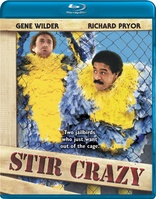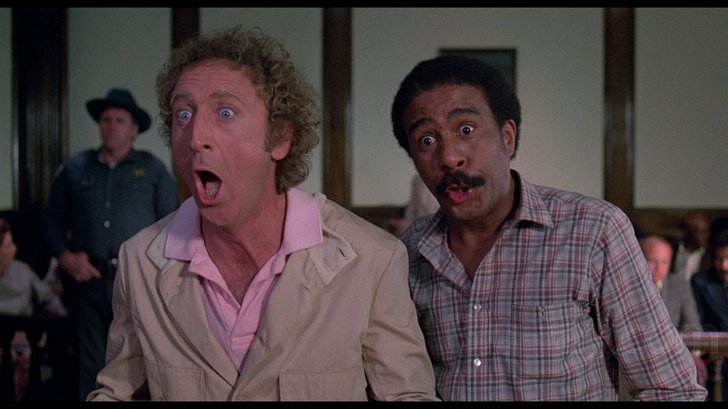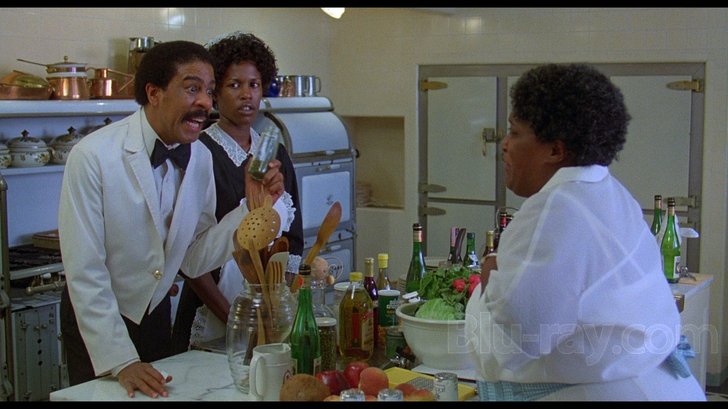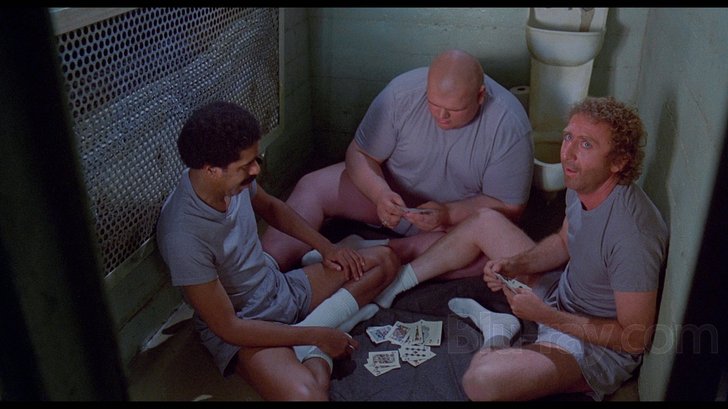Stir Crazy Blu-ray Movie
HomeStir Crazy Blu-ray Movie 
Image Entertainment | 1980 | 111 min | Rated R | Jan 24, 2012
Movie rating
6.9 | / 10 |
Blu-ray rating
| Users | 4.0 | |
| Reviewer | 3.5 | |
| Overall | 3.5 |
Overview
Stir Crazy (1980)
Skip and Harry are framed for a bank robbery and end up in a western prison. The two eastern boys are having difficulty adjusting to the new life until the warden finds that Skip has a natural talent for riding broncos with the inter-prison rodeo coming up.
Starring: Gene Wilder, Richard Pryor, JoBeth Williams, Georg Stanford Brown, Craig T. NelsonDirector: Sidney Poitier
| Comedy | Uncertain |
| Crime | Uncertain |
Specifications
Video
Video codec: MPEG-4 AVC
Video resolution: 1080p
Aspect ratio: 1.85:1
Original aspect ratio: 1.85:1
Audio
English: LPCM 2.0 Mono (48kHz, 16-bit)
Subtitles
English SDH, Spanish
Discs
25GB Blu-ray Disc
Single disc (1 BD)
Playback
Region A (locked)
Review
Rating summary
| Movie | 3.0 | |
| Video | 4.0 | |
| Audio | 3.0 | |
| Extras | 0.0 | |
| Overall | 3.5 |
Stir Crazy Blu-ray Movie Review
That's Right. They Still Ba-a-d.
Reviewed by Michael Reuben January 18, 2012Stir Crazy was a huge hit for stars Richard Pryor and Gene Wilder and an even bigger hit for director Sidney Poitier, who became the first African-American filmmaker to gross over $100 million (and in 1980 that meant something). But I have to confess that, as big a fan as I am of Pyror and Wilder (in the right vehicle), the film has never made me laugh. This may have something to do with the fact that, when Stir Crazy first appeared, I had just finished studying criminal law and was so caught up in the fine points of how justice could miscarry that I couldn't see the comedy in a film about two guys railroaded into prison sentences of 120 years each. Watching the film now, though, I can appreciate the directorial skill with which Poitier steered Pryor and Wilder, both incorrigible improvisers, through Bruce Jay Friedman's goofy script, which works from the familiar premise that tragedy is what happens to you and comedy is what happens to someone else. In the hands of another director, the film could have been a brutal satire on the justice system, but under Poitier's eye it's a Hope and Crosby road movie where nothing truly serious is ever at stake, and we know our heroes will come out OK in the end, after they get knocked around for a while. There'll even be a pretty girl in the bargain.

The film opens in New York City in the late Seventies, when the metropolis was crumbling, crime-ridden and nearly bankrupt and not the tourist destination and urban theme park it is today. Harry Monroe (Pryor) is an aspiring actor who hasn't worked in over a year; so, like many unemployed actors, he works as a waiter, currently for a private caterer. But he loses his job after his private pot stash is mistaken for oregano and used liberally in the cuisine for a high society dinner. Right at the outset, screenwriter Friedman and director Poitier establish the film's rules. What might have been a minor plot point in other hands (Harry losing his job) becomes an opportunity for extended comic riffs, as recriminations fly in the kitchen and stoned behavior cuts through stuffiness in the dining room. Harry's best friend, Skip Donahue (Wilder), is a would-be playwright, who is no more successful than his buddy. Mostly he tries to thrust himself into interactions with people (which New Yorkers hate), calling it research. Meeting for a drink in a darkened bar, Skip and Harry watch a cabby and his passenger come to blows over a fare, then impulsively decide to head west in a beat-up old van. But in Arizona they run short of money and take a promotional gig at a local bank dressed as woodpeckers (woodpeckers?). It's going great, until bank robbers borrow the costumes as a disguise, and everyone assumes the holdup was perpetrated by those damned New Yorkers. In the blink of an eye, and certainly without time for such details as a trial, our heroes go from arrest to 120-year sentences. (Check out their clothes. From the time of arrest, they're in the same outfits until they change to prison blues after sentencing.) They're sent to a state facility populated by stereotypes, including a mincing queen named Rory (a brave performance by Georg Sanford Brown), a good-hearted Latino named Jesus (Miguel Ángel Suárez), a bad-ass gang leader named Blade (Charles Weldon) and a taciturn giant named Grossberger, billed as the most prolific mass murderer in history (Erland van Lidth, who would go on to play Dynamo in The Running Man). But in this alternate universe, the threats to Harry and Skip aren't from other inmates. They're from Warden Walter Beatty (Barry Corbin) and his deputy, Wilson (Craig T. Nelson). Warden Beatty cares more about the annual prison rodeo competition than he does about the welfare of his inmates, and he tests each new arrival for cowboy aptitude on a mechanical bull in his office. When he discovers that Skip is a natural, he uses every means at his disposal to "persuade" Skip to compete (including several that wouldn't pass muster under the Eighth Amendment). Skip holds out until the warden lets him pick his own team, because he, Harry, Angel and Rory plan to use the rodeo as cover for an escape. Meanwhile, their useless Legal Aid lawyer, Garber (Joel Brooks), is supposed to be looking for the two real bank robbers, but he needs a kick up the backside by his comely assistant, Meredith (JoBeth Williams), who goes undercover as a waitress at a strip bar looking for a specific tatoo that one witness spotted on the hand of a bandit. (If you're wondering whether the real purpose of the scene is to show a bunch of topless dancers, you can stop wondering now.) Of course, it only makes sense that Harry's and Skip's lawyers are acting as investigators, which lawyers never do in real life, since there are no actual legal proceedings for them to handle. Meredith succeeds, and so does the escape plan, largely in tandem. Everyone's happy as the heroes and the pretty girl ride off into the sunset, or technically, away from it, since they're returning to New York. No one worries about paperwork, or charges for breaking out of prison, or any of the various people who have tried to kill Skip and Harry (including a rival rider played by veteran character actor Jonathan Banks, who's hard to recognize under sunglasses and a cowboy hat, but he's currently playing tough guy Mike on Breaking Bad). In a Heckle and Jeckle cartoon, you don't sweat the details. The real purpose of the ramshackle plot is to let Pryor and Wilder do bits in their signature styles, bouncing off each other and various personalities they encounter. It must have been a novel experience for Pryor to play the straight man of the pair, and one can just imagine director Poitier chuckling to himself as he reversed all the usual cliches by having the white half of his interracial duo play the goggle-eyed innocent who's never seen working a straight job, has no practical sense of the real world, plays music and miraculously displays inborn athletic talent. Wilder would later disclose in his autobiography that he and Pryor were not close off-screen, and it's doubtful that Pryor could have been close to anyone at the time, since, as we now know, he was descending into a freebase addiction that would nearly kill him the year Stir Crazy was released. But their onscreen chemistry as Harry and Skip is undeniable, and all you have to do is watch the famous scene where they enter county lock-up with Harry trying to teach Skip how to scare off potential attackers by walking "bad". Not since Zero Mostel in The Producers had another actor so successfully tapped into Wilder's deep well of crazy.
Stir Crazy Blu-ray Movie, Video Quality 

Image's 1080p, AVC-encoded Blu-ray offers an impressive presentation of this Sony catalog title from 1980. The source material is in surprisingly good shape. Even the beginning and end titles, which, as is typical for the era before titles were added digitally, are somewhat dirtier and grainier than the rest of the film, look remarkably good. The film's image is generally sharp and detailed, with grain that is visible but natural and never intrusive. Early scenes set in New York City, whether indoors or out, are typically darker with more muted colors. But as soon as Harry and Skip head west, contrast intensifies, colors brighten and become more saturated, and shadows become black instead of gray or brown—all of which confirms that the look of the early scenes is as it should be. The rodeo scenes, which involve both large crowds and a lot of quick motion, offer a worthy demonstration of this Blu-ray's quality, because they reveal both significant detail and an absence of artifacts. This is a fine effort from Sony and Image.
Stir Crazy Blu-ray Movie, Audio Quality 

The original mono soundtrack is presented as PCM 2.0. When played through a good set of stereo speakers in "direct" mode, the track should provide a wide soundstage, much like a typical theatrical array. When played through a matrix decoder, the two identical channels should collapse to the center speaker of a typical home theater array. Either way, the dialogue is very clear, and the lively film score by Tom Scott has good fidelity and dynamic range with surprisingly strong bass extension and a high end that doesn't sound brittle or "thin".
Stir Crazy Blu-ray Movie, Special Features and Extras 

I don't have Sony's 1999 DVD release of Stir Crazy for comparison, but research indicates that it contained the film's trailer. (If any reader has the disc and can confirm this, please contact me.) In any case, the Blu-ray contains no extras.
Stir Crazy Blu-ray Movie, Overall Score and Recommendation 

Appropriately enough, it was Richard Pryor himself who restored a sense of reality to the imaginary world of Stir Crazy. In his brilliant standup film, Richard Pryor Live on the Sunset Strip (1982), which is best known for its frank description of his near-fatal drug addiction, Pryor also riffed on the experience of filming at Arizona State Prison. He began by describing his anticipation of meeting his "brothers" in the prison population, who he imagined would include many railroaded and wrongfully convicted innocents like Harry with whom he would have natural feelings of solidarity. After varying this sentiment several times in an enthusiastic chant, Pryor whirled to the audience with his face abruptly trembling in horror and choked: "Thank God we have penitentiaries!" He then proceeded with graphic impressions of some of the hardened thugs he'd encountered, describing how uncomfortable it made him when Gene Wilder would get too familiar with the prisoners and how finally he'd had to tell Wilder what these guys would do to them if they were regular inmates instead of famous visitors with their own security. It wouldn't have been a Skip-and-Harry experience. It's probably my own fault that I can't suspend disbelief for Stir Crazy, but for those who can, the disc is well-done and recommended.
Similar titles
Similar titles you might also like

See No Evil, Hear No Evil
1989

Almost an Angel
1990

My Cousin Vinny
1992

Quick Change
Warner Archive Collection
1990

Get Hard
Unrated
2015

Night School 4K
2018

Snatched
2017

Peeples
2013

Pardon Us
1931

Our Idiot Brother
2011

I Now Pronounce You Chuck and Larry
2007

The Upside
2017

My Blue Heaven
Warner Archive Collection
1990

The Toy
1982

Armed and Dangerous
1986

Ted 2
2015

The Internship
2013

The Dream Team
1989

Jay and Silent Bob Reboot
2019

The Sitter
Totally Irresponsible Edition
2011